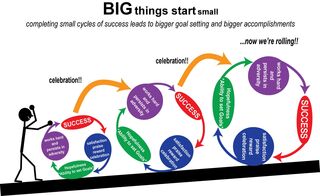Motivation
Why It's Important to Celebrate Small Successes
One simple habit can build a lifetime of motivation.
Posted November 22, 2021 Reviewed by Tyler Woods
Key points
- Our brains are built to remember negatives more than positives (this is called a negativity bias).
- Remembering the positives takes extra effort—but it's the positives that build self-esteem.
- By renewing self-esteem, you build hope and motivation for the future.
Our patients sometimes have great successes to report: “I got all A's,” “I got a raise,” or, simply, “I got a lot more stuff done!” When that happens, congratulations are in order. However, after exclaiming, “That’s wonderful—Woohoo! Great job!” the next thing we ask them (as trite as it may sound) is, “So, how did that make you feel?” Drawing attention to the feeling that accompanies success is as important (if not more so) than celebrating the success itself. Why?
The answer gets to why focusing is even important in the first place. The purpose of focus is not just to get things done, although that is what most people will say if you ask them. But, in the big picture, the task will either get done or not, and life will go on either way. You may get the A’s, or you may get B’s or worse. You will get the promotion, or you won’t. Of course, there are consequences that flow from these outcomes that can be important to the circumstances of your future life.
The Internal Sense of Satisfaction and Pride
Once a task is completed well, it’s not just the external rewards and consequences that matter. It’s also the internal sense of satisfaction and pride. Knowing that you can and did do well is important. One reason why it is important is because it will help build further successes in the future. So, how did it feel when you aced the test? Hopefully, great. But that particular test will come, go, and eventually be forgotten. The great feeling you experienced when you studied hard and succeeded—that feeling will build your self-esteem and encourage you to repeat the process. Once that sinks in and becomes part of you, you will feel better about yourself, be more confident in your abilities, and be able to tackle the next task that presents itself. And that, of course, is the purpose of focus.
If all you are doing is just going from task to task without feeling—then all you are doing is working like a robot. The celebration of achievement and the positive emotion you feel is what tells your brain: "This is why it was worth it to put in all that hard work. It’s this feeling that I’m going after." Our brains are built with a negativity bias, we remember the problems and the failures more easily than the positives and successes. So, take a moment to counter that: notice the positives.
The positive feeling you get when you succeed is what ultimately builds confidence. It builds hope that you will be successful again. When you are confident and hopeful, that improves your ability to focus naturally. When you feel that way, you are more likely to concentrate again on a challenging task in the future because you will feel motivated to get that feeling back. That feeling can ultimately help you succeed and focus while relying less on medications, a worthy goal that patients frequently express. A related question that patients sometimes ask is, “When should I celebrate?” For example, if the ultimate goal is to get A’s, should you celebrate if you have moved from F’s to D’s? If the ultimate goal is to become the store manager, do you celebrate even when you just got a raise or a more minor promotion?
Celebrate Reaching Small, Intermediate Goals

Our answer is: Yes! It’s very important to celebrate when you reach small, intermediate goals on the path to success. In our book, ADHD and the Focused Mind, we describe how one moves from a cycle of failure to a cycle of success. One ingredient is intentionally setting smaller, achievable goals and celebrating when you achieve each one. This is the way to gradually build self-esteem and hopefulness. The momentum you gain from each small success is what will allow you to stay on course toward greater and greater achievements and successes, including achieving your big, long-term goals. Each celebration doesn’t have to be a big one. You don’t have to hire a band and blast confetti each time you do something right. Recognition of yourself and taking a moment to recognize and register how it feels to have done well is all you really need.
More often than we like, our patients look back at us blankly when we ask them how it felt to accomplish their goal. Perhaps they were so focused on the task itself that they forgot to notice the feeling they got when they accomplished it. Some express a note of embarrassment while answering the question because they feel they only accomplished something “small” or “regular” that doesn’t deserve celebration or approval. Some may be burdened by a cultural or parental taboo against paying too much attention to their own victories. To these patients, we say, “You don’t have to shout from the rooftops. You don’t have to do it loudly. You don’t have to tell anyone else. But you do need to take a moment to celebrate each success and notice how it makes you feel internally if you wish to overcome your challenges, build more self-confidence, and experience more successes in the future."


